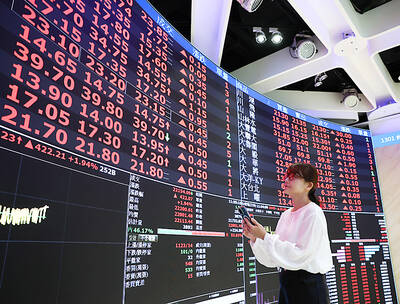Starwood Hotels & Resorts Worldwide Inc on Tuesday took over management of a luxury hotel in central Havana, becoming the first big US hospitality chain with a presence on the island since the Cuban Revolution a half-century ago.
The newly rechristened Cuba Four Points by Sheraton on Havana’s Quinta Avenida — a hotel owned by the Cuban military — will now be managed by the US hospitality giant.
Located in Havana’s Miramar District, the posh hotel — formerly known as the Quinta Avenida hotel — has rooms available from US$246 per night, according to its Web site.
Management of the hotel under the Starwood banner is a point of pride, said Jorge Giannattasio, who oversees the company’s Latin American properties.
“It’s a unique moment, a special moment” to be the first US-based hotel company in 55 years to locate in Cuba, Giannattasio said at a ceremony late on Tuesday marking the reopening of the newly-refurbished, 186-room hotel.
One of the world’s leading hospitality companies, Starwood has more than 1,300 properties in about 100 countries, and also runs the Meridien, W, Westin and Sheraton hotels chains.
The company is soon to assume management of another iconic Cuban hotel — the Inglaterra, an 83-room property which first opened in 1875. Starwood’s entry into the hospitality industry on the communist island is the latest sign of normalized ties between the US and Cuba.
FORMER FOES
The former Cold War foes in July last year restored diplomatic ties severed half a century ago.
US President Barack Obama paid an historic visit to Cuba in March, further cementing the normalization of relations.
US Department of State spokesman Mark Toner on Tuesday told reporters that “providing adequate lodging and safety and security for authorized travelers will increase people-to-people contact, and that’ll benefit the normalization process.”
He said Starwood’s retraining of the staff at the property it now runs in Havana “is going to help develop sector-specific know-how among Cuban employees in the lodging and travel business.”
“This is just one deal, but what we want to keep seeing is a steady increase in these kinds of investments — certainly in the tourist infrastructure for Cuba,” he added.

UNCERTAINTIES: Exports surged 34.1% and private investment grew 7.03% to outpace expectations in the first half, although US tariffs could stall momentum The Chung-Hua Institution for Economic Research (CIER, 中華經濟研究院) yesterday raised its GDP growth forecast to 3.05 percent this year on a robust first-half performance, but warned that US tariff threats and external uncertainty could stall momentum in the second half of the year. “The first half proved exceptionally strong, allowing room for optimism,” CIER president Lien Hsien-ming (連賢明) said. “But the growth momentum may slow moving forward due to US tariffs.” The tariff threat poses definite downside risks, although the scale of the impact remains unclear given the unpredictability of US President Donald Trump’s policies, Lien said. Despite the headwinds, Taiwan is likely

READY TO BUY: Shortly after Nvidia announced the approval, Chinese firms scrambled to order the H20 GPUs, which the company must send to the US government for approval Nvidia Corp chief executive officer Jensen Huang (黃仁勳) late on Monday said the technology giant has won approval from US President Donald Trump’s administration to sell its advanced H20 graphics processing units (GPUs) used to develop artificial intelligence (AI) to China. The news came in a company blog post late on Monday and Huang also spoke about the coup on China’s state-run China Global Television Network in remarks shown on X. “The US government has assured Nvidia that licenses will be granted, and Nvidia hopes to start deliveries soon,” the post said. “Today, I’m announcing that the US government has approved for us

When Lika Megreladze was a child, life in her native western Georgian region of Guria revolved around tea. Her mother worked for decades as a scientist at the Soviet Union’s Institute of Tea and Subtropical Crops in the village of Anaseuli, Georgia, perfecting cultivation methods for a Georgian tea industry that supplied the bulk of the vast communist state’s brews. “When I was a child, this was only my mum’s workplace. Only later I realized that it was something big,” she said. Now, the institute lies abandoned. Yellowed papers are strewn around its decaying corridors, and a statue of Soviet founder Vladimir Lenin

The National Stabilization Fund (NSF, 國安基金) is to continue supporting local shares, as uncertainties in international politics and the economy could affect Taiwanese industries’ global deployment and corporate profits, as well as affect stock movement and investor confidence, the Ministry of Finance said in a statement yesterday. The NT$500 billion (US$17.1 billion) fund would remain active in the stock market as the US’ tariff measures have not yet been fully finalized, which would drive international capital flows and global supply chain restructuring, the ministry said after the a meeting of the fund’s steering committee. Along with ongoing geopolitical risks and an unfavorable